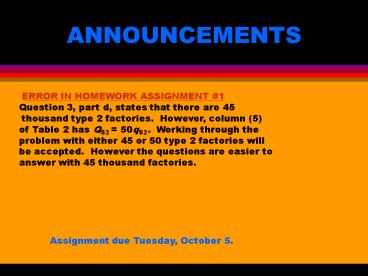ANNOUNCEMENTS - PowerPoint PPT Presentation
1 / 30
Title:
ANNOUNCEMENTS
Description:
OF GASOLINE DEMAND. q = 12.75 -1.16p -0.005pG 0.06y. In 1993 p=1.108, pG=407.7, pop ... gasoline demand in 1993 is q1993=10.52 barrels. per year per person. ... – PowerPoint PPT presentation
Number of Views:51
Avg rating:3.0/5.0
Title: ANNOUNCEMENTS
1
ANNOUNCEMENTS
ERROR IN HOMEWORK ASSIGNMENT 1 Question 3,
part d, states that there are 45 thousand type 2
factories. However, column (5) of Table 2 has
QS2 50qS2. Working through the problem with
either 45 or 50 type 2 factories will be
accepted. However the questions are easier
to answer with 45 thousand factories.
Assignment due Tuesday, October 5.
2
ANNOUNCEMENTS
Exam, Thursday, October 7
Chapters 1 - 6
Multiple choice and short answer.
Practice questions in workbook and on
homepage for Mankiws textbook.
3
ANNOUNCEMENTS
TEACHING ASSISTANTS FOR THIS COURSE
W. Wu BA 123A M 900 - 1100 AM Th 400 - 500 PM
S. Sadhu BA 129K M 200 - 300 PM W 115 - 315
PM
Assistants are available to help with text
material, but NOT WITH HOMEWORK ASSIGNMENTS.
4
ANNOUNCEMENTS
The Economics Department also offers
free tutorial assistance. Schedules can be
accessed through the course homepage http//www.a
lbany.edu/twk58/eco110.html
Tutorial assistance is also available
through Educational Support Services.
5
ELASTICITY
In general, most demand curve have ranges that
are price elastic, unit elastic and inelastic.
However there are some special demand curves with
constant price elasticity.
6
SPECIAL DEMAND CURVES
For this demand curve DQ0, so that the
coefficient of price elasticity of demand
is (DQ/Q)/(DP/P) 0/(DP/P) 0
at every point on the demand curve.
This demand curve is perfectly inelastic
7
SPECIAL DEMAND CURVES
For this demand curve DP0, so that the
coefficient of price elasticity of demand
is (DQ/Q)/(DP/P) (DQ/Q)/0
at every point on the demand curve.
This demand curve is perfectly elastic
8
SPECIAL DEMAND CURVES
For this demand curve, using the midpoints
formula, the coefficient of price elasticity of
demand is (DQ/Q)/(DP/P)(3.75/3.125)/(60/50)
1.0,
PQ100
at every point on the demand curve.
This demand curve is unitary elastic
9
SPECIAL DEMAND CURVES
Note that for a unitary elastic demand curve,
Total Revenue (or Total Expenditure) is
constant. For this demand curve TR80 x 1.25
20 x 5 100.
PQ100
In fact, TRPQ100 everywhere on this demand
curve.
10
GASOLINE DEMAND
11
GASOLINE DEMAND
12
GASOLINE DEMAND
13
GASOLINE DEMAND
14
GASOLINE DEMAND
q 12.75 -1.16p -0.005pG 0.06y
where q is quantity demanded per capita per
year in barrels p is price
per gallon in dollars pG is an index
of the general price level y is
disposable income per capita in
thousands of dollars.
15
PRICE ELASTICITYOF GASOLINE DEMAND
q 12.75 -1.16p -0.005pG 0.06y
In 1993 p1.108, pG407.7, pop258.13
and y(4706.7/258.13)18.23. Then
estimated gasoline demand in 1993 is q199310.52
barrels per year per person (441.84 gallons).
If p falls to 1.00, ceteris paribus, q rises to
10.65.
Then (Dq/q)/(Dp/p)(0.13/10.655)/(0.108/1.054)
0.119 using the midpoints formula.
16
DETERMINANTS OF ELASTICITY
Price Elasticity of Demand will be greater
(1) the greater the number of close substitutes
(2) the less necessary the good
(3) the smaller the spending on the good is as a
proportion of the total budget
(4) the more narrow the market
(5) the longer the time horizon.
17
PRICE ELASTICITIES OF DEMAND
18
PRICE ELASTICITIES OF DEMAND
19
PRICE ELASTICITIES OF DEMAND
20
PRICE ELASTICITIES OF DEMAND
21
INCOME ELASTICITY OF DEMAND
Coefficient of income elasticity of demand
Percent change in quantity demanded
Percent change in income
It measures the responsiveness of changes in
quantity demanded to changes in income.
22
INCOME ELASTICITY OF DEMAND FOR GAS
q 12.75 -1.16p -0.005pG 0.06y
In 1993 p1.108, pG407.7, pop258.13
and y(4706.7/258.13)18.23. Then
estimated gasoline demand in 1993 is q199310.52
barrels per year per person.
If y falls to 18.00, ceteris paribus, q falls to
10.51.
Then (Dq/q)/(Dy/y)(-0.01/10.515)/(-0.23/18.115)
0.075 using the midpoints formula.
23
PRICE ELASTICITY OF SUPPLY
The coefficient of price elasticity of supply
Percent change in quantity supplied
Percent change in price
It measures the responsiveness of changes in
quantity supplied to changes in price.
24
PRICE ELASTICITY OF SUPPLY
Using the midpoints method, the coefficient of
price elasticity of supply is (DQS/QS)/(Dp/p)
(10/55)/(2/9) 0.82
25
PRICE ELASTICITYOF SUPPLY
Supply is elastic if the coefficient of
price elasticity of supply is greater than 1.
Supply is inelastic if the coefficient of
price elasticity of supply is less than 1.
Supply is unit elastic if the coefficient of
price elasticity of supply is equal to 1.
26
SPECIAL SUPPLY CURVES
For this supply curve DQ0, so that the
coefficient of price elasticity of supply
is (DQ/Q)/(DP/P) 0/(DP/P) 0
at every point on the supply curve.
This supply curve is perfectly inelastic
27
SPECIAL SUPPLY CURVES
For this supply curve DP0, so that the
coefficient of price elasticity of supply
is (DQ/Q)/(DP/P) (DQ/Q)/0
at every point on the supply curve.
This supply curve is perfectly elastic
28
SPECIAL SUPPLYCURVES
For any linear supply curve passing through the
origin (0,0), the coefficient of price
elasticity of supply will be 1.
29
SPECIAL SUPPLYCURVES
For this supply curve, using the
midpoints method, the coefficient of price
elasticity of supply is DQ/Q)/(DP/P) (20/110)/(1/
5.5)1.
This supply curve is unitary elastic
30
DETERMINANTS OF ELASTICITY
The price elasticity of supply will be greater,
(1) the easier it is to produce the good
(2) the more time is allowed for production.































